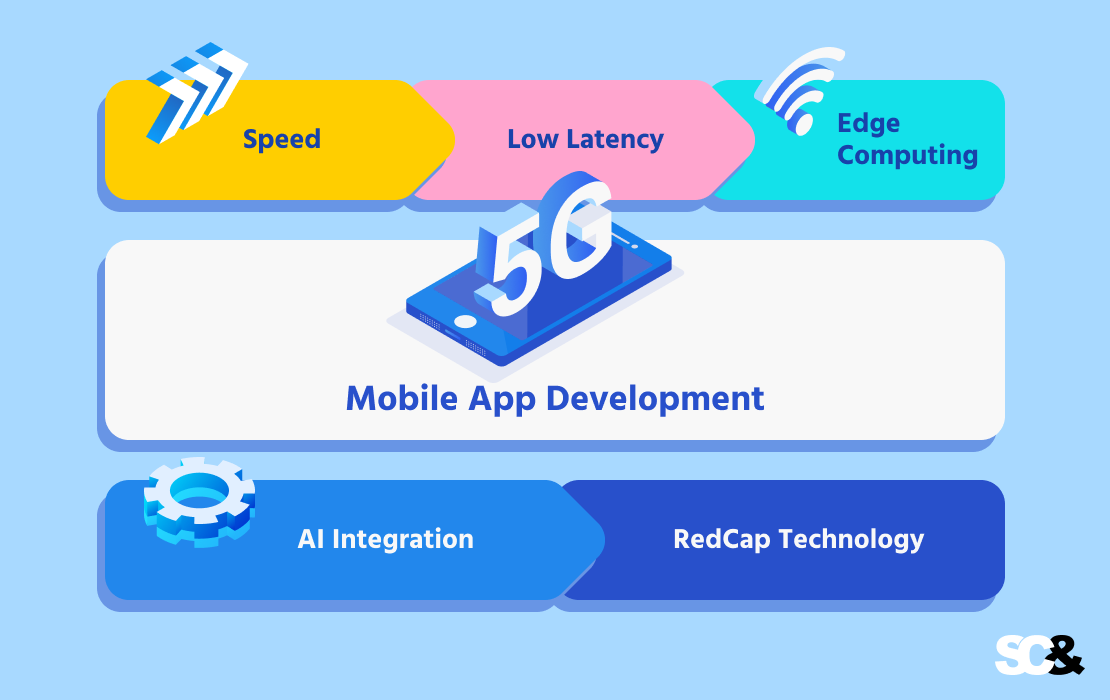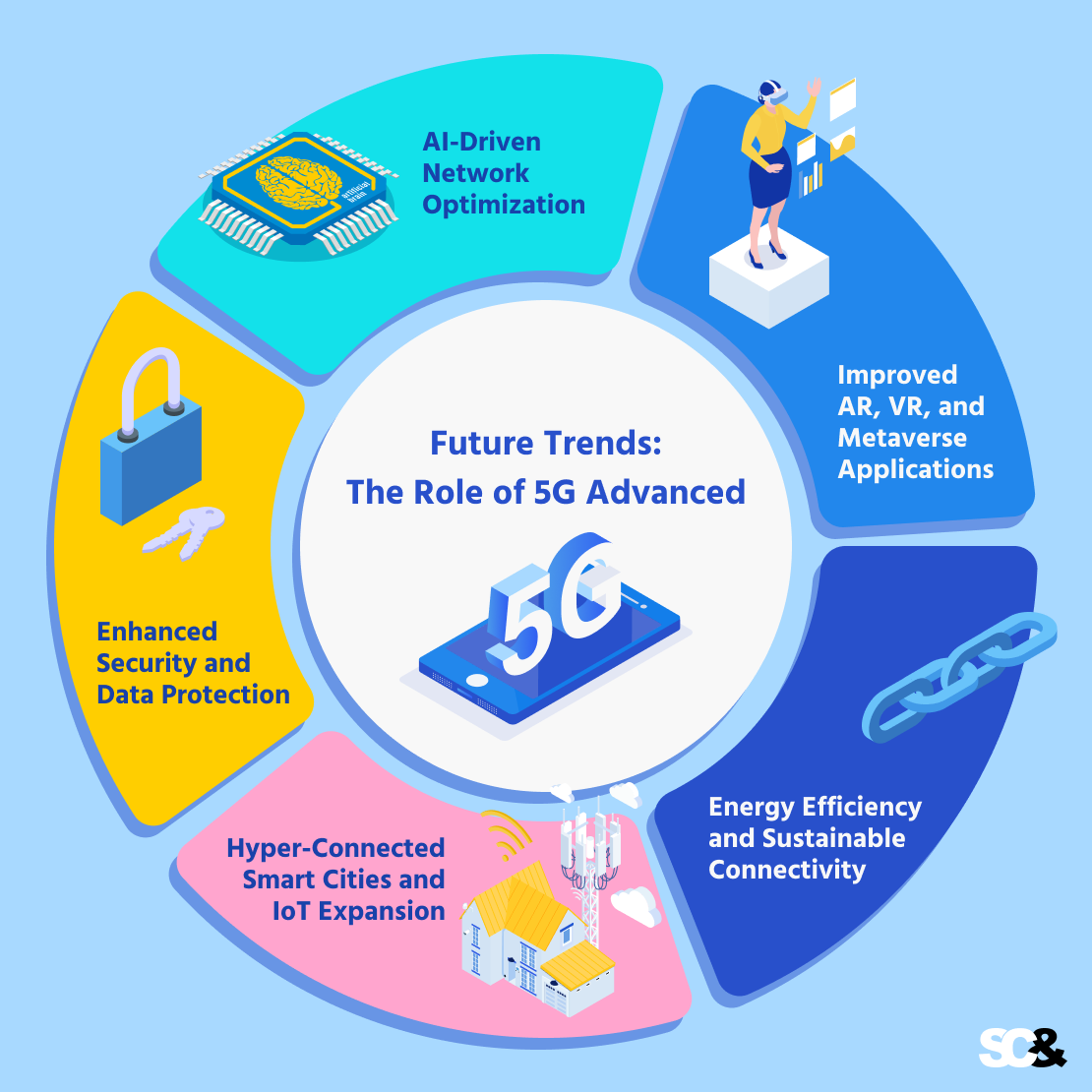How 5G Changes Mobile App Development
Since its launch, 5G technology has grown considerably, revolutionizing all industries. In 2024, it was estimated that there were around 2.27 billion 5G mobile subscriptions globally, a major increase from 1.6 billion in 2023.
This number is projected to surge to nearly 5.65 billion by the end of the decade, as 5G is on track to become the dominant mobile network technology, overtaking 4G according to Statista.
Smartphone manufacturers have gradually incorporated 5G capabilities into their devices, and Apple, Samsung, and OnePlus are market leaders that have launched products compatible with 5G. In this article, we explain the actual advantages of 5G, how it is changing mobile application development, and why your business needs it.
The Evolution of Cellular Technologies
The development of cellular networks has come a long way in transforming the manner in which individuals communicate and use online services. Every generation of mobile technology has provided spectacular breakthroughs in terms of speed, connectivity, and capability.
| Generation | Era | Key features | Impact |
| 1G | 1980s | – Analog voice calls
– Poor sound quality – Limited coverage |
Supported simple mobile communication with a data transfer speed of 2.4 Kbps. |
| 2G | 1990s | – Digital voice transmission
– SMS messaging – Improved security |
Added text messaging and better call quality with an average speed of 50 Kbps. |
| 3G | 2000s | – Mobile internet
– Video calling – Multimedia messaging (MMS) |
Introduced the mobile web and laid the foundation for smartphone apps, recording transfer speed around 2 Mbps. |
| 4G | 2010s | – High-speed mobile broadband
– HD video streaming – Cloud services |
Enabled seamless streaming, mobile gaming, and real-time internet access, showing speed of 100 Mbps. |
| 5G | 2020s | – Ultra-fast speeds (up to 10 Gbps)
– Low latency (1 ms) – High device connectivity (IoT, AI, AR/VR) |
Revolutionized industries with real-time data processing and smart applications, reaching a peak speed of up to 10 Gbps. |
| 5G Advanced | 2025+ | – AI-driven network optimization
– Energy efficiency – Enhanced security |
Improves 5G performance, enabling smarter and more efficient digital solutions. |
| 6G | 2030+ | – Terahertz communication
– AI networks – Holographic telepresence |
Expected to introduce futuristic applications. |
With 5G Advanced and 6G on the horizon, the evolution of cellular technologies continues to shape the future of communication and digital transformation. But let’s focus on 5G!
What Is 5G?
5G showcases the most recent advancement in the wireless networking system, capable of processing data up to a hundred times more rapidly than 4G. It offers real-time data processing and serves sophisticated technologies like the Internet of Things (IoT), Augmented Reality (AR), Virtual Reality (VR), Artificial Intelligence (AI), and others. The rollout of 5G Advanced in 2025 will also add more along with energy efficiency and AI-sustained network optimization.
Features of 5G Influencing Mobile App Development
The positive impact of 5G on mobile app development is undeniable. 5G transformed how mobile apps are made and opened up new opportunities. Let’s see the major technical aspects of 5G that enabled this:

- Speed raised from 4G’s 100 Mbps to 5G’s 10 Gbps, providing a smoother wireless connection on mobile devices outside. It’s become achievable due to 5G’s higher radio frequencies that have the range of 30 GHz to 300 GHz, including all the preceding 1G-4G cellular spectrums.
- Low latency, dropping from 4G’s 50 milliseconds to 5G’s one millisecond. This incredible latent period decrease means no image delay when broadcasting competitions or other events as if their viewers are present.
- The high density of connections. 5G can connect one million devices per 0.38 sq. miles, compared to 2000 devices per 0.38 sq. miles for 4G.
- Edge Computing. Edge Computing takes advantage of 5G to establish data processing centers near end-users thus minimizing system delays and enhancing program operation.
- AI Integration. Combining AI with 5G networks grants better traffic administration and smarter asset allotment.
- RedCap Technology. RedCap became a part of 5G Advanced eliminating connection complexities to produce affordable energy-effective devices.
- Energy Efficiency. The novel 5G system architecture includes components to maximize IoT devices’ power period. Implementing this attribute achieves superior advantages for industrial IoT apps and smart city innovation.
How 5G Changes and Impacts Mobile App Developers
Fifth-generation networks improve mobile application productivity and effectiveness levels so users can experience advanced functionality. Application developers must prepare their apps for future implementation of new technologies that will work using 5G capacity.

Here are examples of how 5G impacted mobile app development:
Fast file exchange
High 5G data transport speeds are achievable because of the high-frequency airwaves in its electromagnetic spectrum. Therefore, to enable data communication with 5G, developers have to either upgrade the current apps or develop new applications that would be capable of leveraging the technology.
Media-enhanced user experience
With the introduction of 5G, user interface (UI) determines whether an app succeeds or fails with consumers. Premium technologies improve the experience of users, such as UltraHD videos and VR/AR, which are not possible with slow internet speeds.
Moreover, 5G reduces buffer time, making UX more engaging. With 5G technology, gamers can download heavy gaming packages without searching for a nearby Wi-Fi spot.
Hardware independence
The usage of 5G technology revolutionized the processing work for smartphone data to cloud computing platforms. App developers must therefore understand how to leverage the power of the cloud. The apps do not need installation on smartphones and their processing ability transcends any modern smartphone barrier.
While most of the data processing work is done remotely, mobile device hardware can assume new functions and enhance the work of the existing ones that would allow the use of 5G apps. For example, workload redistribution means longer battery life on smartphones.
New security standards
5G allows faster connection among gadgets, higher density per sq.mile, and heavier cloud-based solution reliance. This results in easier data interception and individual device tracking.
Apps with several network connections
Another innovation that app developers have to bring into the limelight is the need to build apps with more web connections. 5G has been coming out across the globe for years now, yet mobile devices in some regions must still transition to 3G and 4G networks. This offers a secure internet connection but makes it difficult for developers.
The rise of navigational apps
The 5G networks encouraged the development of other technologies, one being the IoT. IoT allows devices to be better connected and Smart City systems to be developed.
Smart City is a system of connected devices that gather, process, and exchange data to improve city architecture. For example, the gathered and processed data in a particular city district can warn people about traffic jams, notify them about gas station locations, etc. These things make city navigation a seamless and enjoyable experience for townspeople.
Future Trends: The Role of 5G Advanced

With 5G already on its way to global proliferation, the next layer of this technological evolution, 5G Advanced, promises to drive even more innovation.
5G Advanced, scheduled as a rollout around 2025, goes beyond 5G, building on the existing bedrock for even better performance and more intelligent experience. It brings network optimization, greener connectivity, and a bolstered capacity for IoT.
AI-Driven Network Optimization
One of the biggest contributions of 5G Advanced is the employment of Machine Learning (ML) and AI to boost network implementation.
Hence, using AI, web resources are dynamically allocated on the fly and provide connectivity in congested areas. AI diagnostics will enable mobile carriers to identify problems before they reach subscribers. This makes possible dynamic bandwidth allocation across the network based on customer needs with games and video streaming given top priority.
These enhancements will make mobile applications smarter and faster.
Energy Efficiency and Sustainable Connectivity
5G Advanced places a heavy accent on sustainability, with web providers trying to minimize the power needed to run their networks.
With the new architecture, power will be refined based on instant demand so that energy is not wasted. They will use low-power protocols so IoT sensors and devices can function for years without replacing the battery. Operators will use more effective base stations and data centers to reduce environmental effects.
This will profoundly help industries dependent on smart cities and industrial automation.
Improved AR, VR, and Metaverse Applications
5G Advanced will enable next-gen immersive experiences (AR, metaverse, and VR).
The cloud will compute complex graphics in AR/VR applications, thus, reducing the need for high-end hardware. Metaverse applications will be more realistic and interactive with almost instant response times. 5G Advanced will enable tactile internet (remote surgery, virtual shopping, collaboration for remote working, etc.)
Hyper-Connected Smart Cities and IoT Expansion
5G Advanced will break IoT connectivity boundaries and permit smart cities and independent vehicles.
Networks will support billions of connected and autonomous Internet of Things devices, from traffic lights to wearable medical monitors; self-driving vehicles will be able to benefit from ultra-fast and real-time communication with road infrastructure and nearby vehicles; cities can use 5G-enabled sensors for real-time monitoring of traffic, air quality, and utilities that will ultimately improve urban planning.
Such development will build a force for smart transfer and AI-enabled automation in urban environments.
Enhanced Security and Data Protection
Growing wireless data rate and number of connected devices guarantee that security remains a prime concern for 5G Advanced, with encrypted algorithms used to protect delicate data in transit and storage and constant authentication for all devices and components to deal with unwanted access.
The Path to 6G: What Comes Next?
5G Advanced will be a precursor to 6G. 5G Advanced will expand the 5G feature set, while 6G will include terahertz communications and some form of space-based networking.

Some predictions include:
- Holographic Telepresence: Three-dimensional holograms in real-time for business meetings or entertainment.
- Brain-computer Interfaces (BCI): Direct interaction between human thoughts and digital gadgets.
- Beyond Smart Cities: Self-governing AI-based cities with hyper-smart automation. 5G Advanced is opening the way for the next digital revolution that will transform our industries and how we interact with technology.
Why Adopt 5G in Business Apps
5G is a relatively new network introduced for mass use. Businesses and app developers are only learning how to take advantage of 5G. However, it’s already clear that this network has a bright future.
The 4G system revealed signs of ineptitude in supporting the connectivity demands of its users. There are studies that prove 4G’s inability to provide high network speeds to all users connected. 5G can address all these challenges with ease and even spur faster development of other digital solutions.
Those businesses that already embraced 5G technology ensured their leading market positions. The mobile industry continues to evolve, bringing devices constructed specially for 5G. Mobile market leaders offer devices that support the large amounts of data created and rising customer demands.
We, at SCAND, are leading the way in using 5G technology for developing mobile applications. Our focus is on building modern apps that take advantage of fast data speeds and cloud-based computing.
With our skills, you can easily add advanced features, such as AR/VR and IoT solutions to your apps. We also know how to work with large projects — startups and businesses that need large-scale and high-quality development.












